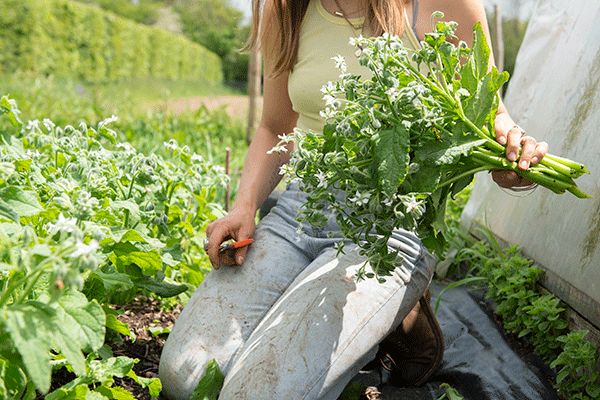‘Roses are red, violets are blue…’ These words will no doubt feature in untold numbers of Valentine’s Day cards and poems this year – as they have for many years before, and no doubt will in future. Because when it comes to romance, let’s face it, we’re suckers for tradition. And when it comes to Valentine’s Day, tradition means roses.
Despite the fact this native flower doesn’t naturally bloom until at least May in the UK, around 570 tonnes are sold each year in the run up to 14 February. Even for those who try to follow the seasons as far as possible in food, for some reason our fastidiousness does not always extend to flowers.
“There’s definitely a strong movement toward transparent supply chains and being careful about where we get our food from, but the floral industry seems to be behind,” says Lulu Cox, ex-Rochelle Canteen sous chef, grower and one third of the trio that founded the SSAW Collective: a community of chefs, florists and growers committed to positive and progressive ecological change.

“The word seasonal is defined as something ‘available or happening during a particular time of the year’. For organic produce, this means something that naturally grows or can grow at a particular time of year in a particular place. Unfortunately, with the globalisation of the floriculture industry, the relationship to locality seems to have been lost,” laments co-founder, flower grower and florist Jess Geissendorfer. “Roses are available year-round, just like we can buy blueberries 12 months of the year.”
But is this necessarily a problem? Well, for a start, just one bunch of roses is estimated to be responsible for around 32kg CO2 emissions. Typically flown in from the Netherlands or Kenya, “like fresh produce, flowers are particularly perishable, meaning they need to be flown and trucked rather than shipped, not to mention refrigerated, in order to arrive fit for use,” Geissendorfer explains.
Not only that, but long supply chains also allow for shadowy growing and labour practises. “There are many uncomfortable truths hiding behind the imported cut flower industry,” she continues. “Flowers, like food, are grown all year round, in heated greenhouses, covered with chemicals and pesticides – but these are regulated much less heavily than those used on food, as they are classed as ornamental rather than consumable, despite these being handled extensively by farm workers, packers, wholesalers, florists and then finally the customer.”

Factor in high water usage, energy consumption from the heating of greenhouses and pesticide runoff, and it’s unsurprising that the global floriculture industry is a contributor to global warming.
Thanks to the likes of SSAW Collective and the conscious flower growers and florists springing up across the country, though, there is another way. “The regenerative agricultural movement is gradually becoming more widely recognised as a major solution to climate change. Flowers, just like food, grown regeneratively (or in a similar ethical vein) can have a genuinely positive impact on our environment and help reverse the damage caused by intensive farming techniques,” Geissendorfer continues.
“They can increase biodiversity and pollinator populations, keep our soil healthy and help to sequester carbon – all at the same time as bringing the joy that beautiful flowers always do.”
But buying flowers grown in these conditions requires a change in our expectations. Much like how a shop bought cake lasts for weeks longer than anything homemade, the window in which we have to appreciate flowers grown without the heavy use of chemicals is undoubtedly shorter.

Image Natasha Marshall for SSAW Collective.
“Put a bunch of roses grown in the UK using regenerative practices next to something grown in a monoculture and imported, it’ll look completely different,” says Cox. “They look more like a garden rose. Their stems won’t be like pencils, but they’ll be more fragrant and full of colour. We just need to understand and appreciate that it’s a live product that needs to be looked after. Cut the stems, change the water and it will continue to flourish.”
Check out websites such as flowersfromthefarm.co.uk where you can find local flower farms and buy direct from growers who care – and don’t be afraid to ask questions. “Look for Fairtrade labels and chat to your local florist about the provenance of their stock. It’s a lot easier to have a conversation than to find out where the flowers are from if you buy through an online retailer,” Geissendorfer advises.
Ask questions when you’re at your local florists: “Where are they from? Are they British?” adds Cox. “How workers have been treated and the chemicals they’ve been exposed to, what they’re being paid; that’s so often very much behind closed doors.”

Image Natasha Marshall for SSAW Collective.
An easy place to start when it comes to more conscious flower-buying is to simply look around you and take inspiration from nature. “Look outside, in your local parks, gardens, woodlands and indulge in spotting the very earliest signs of spring. Depending on where you are, there may well be some daffodils popping their heads up, muscari or snowdrops too,” Geissendorfer continues.
“Flowers grow so well in this country. We have an amazing, flowing season from March till October and there’s such a huge variety of choice. There are so many UK growers that we really shouldn’t be looking further afield. We don’t need to,” states Cox.
And if you really can’t bear to go without your beloved roses till summer? “Perhaps a gift of a bare root to plant, from which you can reap the benefits of over years,” Geissendorfer suggests – sounds pretty romantic to me.












Thank you for posting this. It is something about which we all need to be aware. My children send me flowers and I am waiting for an opportunity to talk to them about it, but in the meantime I will send this link.